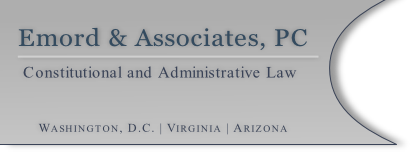
Emord & Associates is dedicated to serving the needs of its national client base. The firm’s attorneys represent clients in constitutional and administrative law cases before the Food and Drug Administration (FDA), the Federal Trade Commission (FTC), the Drug Enforcement Administration (DEA), the Department of Justice (DOJ), the Department of the Interior, the Bureau of Land Management (BLM), the National Park Service (NPS), the Equal Employment Opportunity Commission, the Environmental Protection Agency (EPA), and the Federal Communications Commission (FCC).
FDA | USDA | Import | Export | FTC | Advertising | Compliance | Dietary Supplements | Foods | Labeling | Prescription & OTC Drugs | Cosmetics | Animal Feeds & Supplements | DEA | Controlled Substances | Medicare | Licensing | Commercial Litigation | Contracts | Business | Civil Litigation | Constitutional Law
Copyright © 2010 Emord & Associates, P.C. All rights reserved | Sitemap






The firm represented victorious plaintiffs in each of the following significant federal cases:

Pearson v. Shalala, 164 F.3d 650 (D.C. Cir. 1999), rehearing den., 172 F.3d 72 (D.C. Cir. 1999) (“Pearson I”)
In the landmark Court of Appeals decision, Pearson I, Emord & Associates filed suit on behalf of Durk Pearson; Sandy Shaw; American Preventative Medical Association; and Citizens for Health against the FDA, challenging the First Amendment validity of FDA regulations that censored four of the plaintiffs’ health claims (folic acid/neural tube defect risk reduction; antioxidant vitamins/cancer risk reduction; omega-
Pearson v. Shalala, 130 F. Supp. 2d 105 (D.D.C. 2001) (“Pearson II”)
After Pearson I, FDA continued to refuse to authorize the plaintiffs’ folic acid claim. The court held that FDA violated the First Amendment in suppressing the claim rather than proposing a clarifying disclaimer to accompany the claim because the claim was, at worst, only potentially misleading. The court stated, “FDA simply failed to comply with the constitutional guidelines outlined in Pearson [I].” “Indeed, the agency appears to have at best, misunderstood, and at worst, deliberately ignored, highly relevant portions of the Court of Appeals Opinion.” The court remanded the folic acid claim to FDA with instructions that the agency draft one or more “short, succinct, and accurate alternative disclaimers, which may be chosen by Plaintiffs to accompany their Folic Acid Claim.” Read the decision.
Pearson v. Thompson, 141 F. Supp. 2d 105 (D.D.C. 2001) (“Pearson III”)
In Pearson III, FDA filed a motion for reconsideration of the court’s decision in Pearson II. The court denied FDA’s motion because it failed to show new facts or clear errors of law which compel the court to change its position. In its decision, the court reiterated that “if a health claim is not inherently misleading, the balance tilts in favor of disclaimers rather than suppression.” It also reiterated that FDA must demonstrate with empirical evidence that disclaimers would bewilder consumers and fail to correct for deceptiveness, before it can suppress the folic acid claim. On June 4, 2006, this case was dismissed after an agreement was reached that allowed the labels of dietary supplements containing folic acid to display the health claim with a disclaimer proposed by FDA and chosen by the plaintiffs. Read the decision.
Whitaker v. Thompson, No. 00-
On April 2, 2001, Judge Paul L. Friedman of the U.S. District Court for the District of Columbia dismissed the complaint in Whitaker v. Thomspon filed by Emord & Associates that challenged an FDA decision concerning a health claim relating to the intake of B vitamins, folic acid, and a reduction in the risk of vascular disease. The dismissal followed an agreement reached between FDA and the plaintiffs in which FDA abandoned its refusal to allow the claim, stating its intention to exercise enforcement discretion to allow the claim on dietary supplement labels so long as a disclaimer accompanied the claim. Read the decision.
Whitaker v. Thompson, 248 F. Supp. 2d 1 (D.D.C. 2002) (“Whitaker I”)
In Whitaker I, Emord & Associates challenged FDA’s renewed decision prohibiting dietary supplement labels from including the antioxidant vitamin health claim at issue in Pearson I. FDA prohibited the claim because it found a lack of significant scientific agreement in support of the claim, and because it found that the weight of the evidence against the claim was stronger than the evidence in favor of it, and therefore concluded that the claim was inherently misleading and could not be rendered non-
In Nutrceutical Corp., Emord & Associates filed suit on behalf of Nutraceutical Corp. and Solaray, Inc. challenging an FDA regulation banning all ephedrine-
Alliance for Natural Health v. Sebelius, 714F. Supp. 2d 48 (D.D.C. May 27, 2010) (“ANH I”)
In Alliance for Natural Health, Emord & Associates filed suit on behalf of Alliance for Natural Health US; Durk Pearson and Sandy Shaw; and Coalition to End FDA and FTC Censorship against the FDA alleging that its censorship of ten selenium-
Alliance for Natural Health v. Sebelius, 786 F.Supp. 2d 1 (D.D.C. Apr. 13, 2011) (“ANH II”)
In ANH II, Emord & Associates filed suit on behalf of the Alliance for Natural Health US; Durk Pearson and Sandy Shaw; and the Coalition to End FDA and FTC Censorship against the FDA alleging that its censorship of antioxidant vitamin and cancer risk-
Center for Science in the Public Interest, et al. v. Food and Drug Administration, No. 1:03-
In Center for Science, Emord & Associates represented intervening parties who moved to block the Center for Science (CSPI) from overturning the Pearson decision. Read the decision.

- Pearson v. Shalala (“Pearson I”)
- Pearson v. Shalala II (“Pearson II”)
- Pearson v. Thompson (“Pearson III”)
- Whitaker v. Thompson
- Whitaker v. Thompson (“Whitaker I”)
- Nutraceutical Corp. V. Crawford
- Alliance for Natural Health v. Sebelius (ANH I)
- Alliance for Natural Health v. Sebelius (ANH II)
- Center for Science in the Public Interest v. FDA

PLEASE NOTE: THE DECISIONS PUBLISHED ON THIS WEB SITE ARE NOT AN ALL-
| Significant Cases |
| Health Claims |
| First Amendment Hall of Fame |
| Jonathan W. Emord, Esq. |
| Peter A. Arhangelsky, Esq. |
| Bethany R. Kennedy, Esq. |
| Eric J. Awerbuch, Esq. |
| Josh S. Furman, Esq. |
| Marije Osse |
| News With Views (Emord) |
| Press Releases |
| Upcoming Seminars |
| Take Action |
| Research |
| News |



